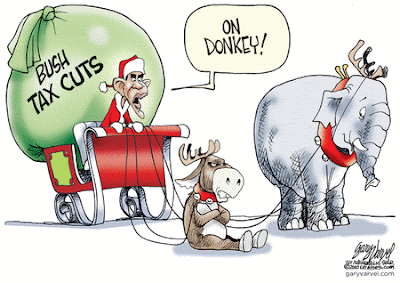
Economics, as a branch of the more general theory of human action, deals with all human action, i.e., with mans purposive aiming at the attainment of ends chosen, whatever these ends may be.--Ludwig von Mises
Thursday, December 9, 2010
Thursday, September 16, 2010
Friday, September 10, 2010
Why the Bush Tax Cuts Worked
Extending the Bush tax cuts — permanently — is a crucial step in restoring economic growth. The Bush cuts provided lower taxes on ordinary income, especially for taxpayers at the high end of the income distribution. These are some of the most energetic and productive people in society; raising tax rates would discourage their effort and entrepreneurship. High-income taxpayers also have multiple ways of avoiding high tax rates, so any revenue gain from raising rates would be modest.
The Bush cuts also lowered taxes on dividend and capital gains income; maintaining these lower rates is even more important for economic performance. Capital is mobile: when it is taxed heavily here, it flees somewhere else, meaning lower investment and employment in the United States. And because capital income taxes discourage investment or drive it overseas, they generate little if any tax revenue.
Opponents of the tax cuts do not seriously dispute these claims about the productivity benefits of lower rates. Instead, their real objection is that the Bush tax cuts (allegedly) favor the wealthy.
read the entire essay
Monday, August 2, 2010
Bush Tax Cuts and the Federal Deficit
Although the cuts were large and drove revenue down sharply, they are not the main cause of the sizable deficit that exists today. In 2007, well after the tax cuts took effect, the budget deficit stood at 1.2 percent of GDP. By 2009, it had increased to 9.9 percent of the economy. The Bush tax cuts didn't change between 2007 and 2009, so clearly something else is to blame.
The main culprit was the recession -- and the responses it inspired. As the economy shrank, tax revenue plummeted. The cost of the bank bailouts and stimulus packages further added to the deficit. In fact, an analysis by the Center on Budget and Policy Priorities indicates that the Bush tax cuts account for only about 25 percent of the deficit this year.
Thursday, July 29, 2010
My Tax Burden

Calculate to estimate your 2011 income tax under three scenarios:
1. Congress allows all of the Bush tax cuts to expire;
2. Congress acts to extend into 2011 all of the Bush tax cuts; and
3. Congress passes the tax laws suggested by President Obama's budget, letting some tax cuts expire, extending some, and enacting some new tax laws.
go to the site
Cartoon: Bush Tax Cuts Expiring
Wednesday, July 14, 2010
The Bush Tax Cuts and the Deficit Myth
Myth #1 The Bush tax cuts wiped out last decade's budget surpluses
Sen. John Kerry (D., Mass.), for example, has long blamed the tax cuts for having "taken a $5.6 trillion surplus and turned it into deficits as far as the eye can see." That $5.6 trillion surplus never existed. It was a projection by the Congressional Budget Office (CBO) in January 2001 to cover the next decade. It assumed that late-1990s economic growth and the stock-market bubble (which had already peaked) would continue forever and generate record-high tax revenues. It assumed no recessions, no terrorist attacks, no wars, no natural disasters, and that all discretionary spending would fall to 1930s levels.
The projected $5.6 trillion surplus between 2002 and 2011 will more likely be a $6.1 trillion deficit through September 2011. So what was the cause of this dizzying, $11.7 trillion swing? I've analyzed CBO's 28 subsequent budget baseline updates since January 2001. These updates reveal that the much-maligned Bush tax cuts, at $1.7 trillion, caused just 14% of the swing from projected surpluses to actual deficits (and that is according to a "static" analysis, excluding any revenues recovered from faster economic growth induced by the cuts).
The bulk of the swing resulted from economic and technical revisions (33%), other new spending (32%), net interest on the debt (12%), the 2009 stimulus (6%) and other tax cuts (3%). Specifically, the tax cuts for those earning more than $250,000 are responsible for just 4% of the swing. If there were no Bush tax cuts, runaway spending and economic factors would have guaranteed more than $4 trillion in deficits over the decade and kept the budget in deficit every year except 2007.
He concludes:
Entitlements and other obligations are driving the deficits. Specifically, Social Security, Medicare, Medicaid and net interest costs are projected to rise by 5.4% of GDP between 2008 and 2020. The Bush tax cuts are a convenient scapegoat for past and future budget woes. But it is the dramatic upward arc of federal spending that is the root of the problem.

